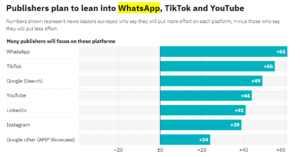For 2024, media and journalists must urgently rethink their role and purpose. Media in Latin America will face the disruptive power of artificial intelligence (AI) and will have to endure a super election year with presidential elections in six countries.
This is according to the latest report “Journalism, media and technology trends and predictions 2024,” penned by journalist and researcher Nic Newman and published by the Reuters Institute for the Study of Journalism (RISJ), which predicts what the global industry can expect in 2024.
The results obtained are based on a survey of 314 media leaders (CEOs, editors, digital and innovation heads, among others) from 56 countries, carried out during the months of November and December 2023.
Journalists from Latin American countries such as Ecuador, Costa Rica, Nicaragua, Uruguay, Mexico, Brazil and Colombia were included as part of the sample.
“It's fair to say the vast majority [of respondents are] from Europe/US axis. We try to increase and improve the representation every year,” Newman told LatAm Journalism Review (LJR)
“In general what we find (from our digital news report data, too) is that Latin American countries are more dependent on social platforms of course and have weaker direct connections with news brands. Partly as a result, paid news is less developed... and Latin America is generally behind the U.S. and parts of Europe in terms of adoption of AI trends by the industry in particular,” he added.
Below, LJR summarizes the highlights of the global report.
The pressures caused in the media by the wars in Ukraine and the Middle East, climate change, the consequences of the pandemic and the economic recession will continue in 2024.
According to the survey, only half of media leaders (47%) are confident about the outlook for journalism this year; around four in ten (41%) are uncertain and a tenth (12%) express low confidence.
Although this year there will be crucial elections in more than 40 democracies worldwide, including six presidential elections in Latin America, which in many cases means greater news consumption and increased traffic, there are fears that “divisive and polarised politics will further undermine trust in the news media.”
According to the author of the report, in order to survive, media companies will have to embrace digital and at the same time continue to squeeze revenue from traditional channels.
“Digital subscription and membership (80%) has extended its lead over display advertising (72%) as the most important revenue focus for the year ahead, with most publishers looking to combine three or four different income streams,” the report says.
Media leaders, too, have less hope of getting additional money from big tech companies. Meta has cut its financial contributions to journalistic organizations and it is not known for sure what the contributions of AI companies will be.
Paid newsletters and podcasts seem to be a solution in the search for income diversification.
According to the report, if 2023 was the year of assimilating to generative AI, 2024 will be the year of full incorporation of these technologies into workflows.
Additionally, media outlets are expecting a reduction in their traffic due to the integration of AI into search engines and other tools.

In the recent Argentine election campaign, AI-generated images were used to denigrate the image of two main candidates (Photo: Screenshot).
"Google, Microsoft, and others have been exploring new ways of surfacing content known as Search Generative Experiences (SGE), that serve direct answers to queries rather than provide the traditional list of links to websites,” the report says.
Due to the proliferation of AI, legal battles over copyright and impediments to large AI platforms from accessing content are expected. According to forthcoming Reuters Institute research, less than 20% of news organizations in Mexico deny access to their content.
“Latin American publishers have been slower to adapt, with many still not having fully adapted to digital or multiplatform working, they are less well equipped to cope with the next disruption from AI, though the ones who answered our survey were acutely aware of the threat,” Newman told LJR.
It is also feared that during the electoral processes expected this year in Latin America, and the world, politicians and activists will use AI to influence the results.
It was already seen in the recent Argentine election campaign, where AI-generated images were used to denigrate the two main candidates.
“The eventual winner was depicted as a bloodthirsty ghoul, while a fake video showed the other main contender floundering in the trenches as part of the cast of the First World War movie 1917,” the report says.
The Reuters Institute points to a decline in "traditional" social networks such as Facebook and X. The survey shows that media leaders will pay more attention to TikTok and YouTube in 2024.
As also predicted last year, in 2024 media plan to produce more video, more podcasts and more newsletters but the production of text articles is not expected to increase.

The media will put more energy into WhatsApp in 2024 due to the launch of WhatsApp's channels (Graphic: Reuters Institute).
“Publishers also think there are opportunities to drive more referrals from messaging services like WhatsApp (+61), business networks like LinkedIn (+41), as well as relatively new sources of traffic such as Google Discover,” the report says.
This decision by the media to put more energy into WhatsApp comes from the launch of a new feature that allows brands and celebrities to create broadcast channels. It is not the same as WhatsApp groups, in this case the user can subscribe, reacting to the publication, but cannot send comments.
“The launch of WhatsApp channels is super relevant in Latin America because of the extremely heavy use for news (unlike Europe),” Newman said.
WhatsApp channels have been available since September 2023 in more than 150 countries. Instagram has a similar functionality.
In conclusion, for the Reuters Institute, technology is advancing at an accelerated pace beyond human capacity. Therefore, media organizations must embrace change and interference and find ways to coexist with machines productively.